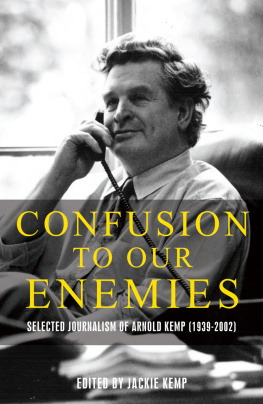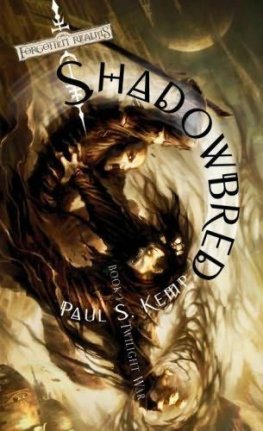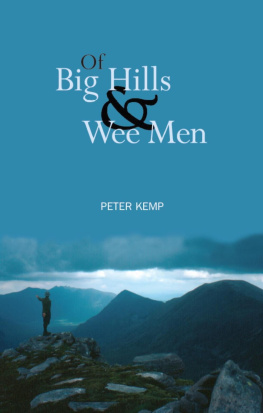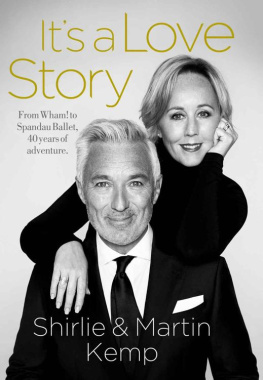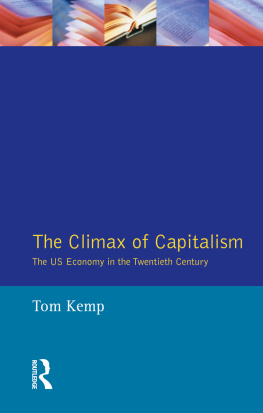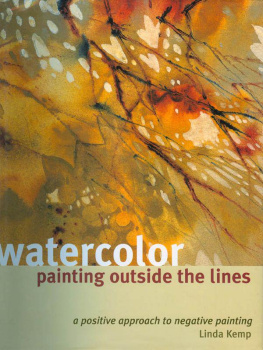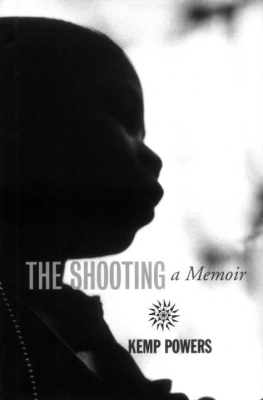CONFUSION
TO OUR
ENEMIES
SELECTED JOURNALISM OF ARNOLD KEMP (1939-2002)
EDITED BY JACKIE KEMP
FOREWORD BY PROFESSOR TOM DEVINE
Neil Wilson Publishing Glasgow
Contents
Acknowledgements
MANY PEOPLE HAVE HELPED AND supported me in the enjoyable undertaking of putting together a selection of my fathers writing.
First, I would like to thank Arnolds long-term partner Anne Simpson for her invaluable help and support thoughout the project, including editing part of this book.
I would also thank contributing editor Anna Burnside; Arnold Kemps many friends and colleagues who have supported this project including his brother David Kemp, Tom Devine, Magnus Linklater, Harry Reid, Robin McKie, Neal Ascherson and Kenneth Roy and the staff of the Scottish Review, who established the Arnold Kemp award for young Scots; The Herald, The Scotsman and The Observer for allowing me to reprint material; editorial assistant Anne-Marie Hollywood; Christine McGilly et al of The Herald archive at the Mitchell Library in Glasgow and Sally Harrower of the National Library of Scotland (which now has my fathers papers); the Scottish Poetry Library; Mary-Jane Bennett for proofreading the manuscript; Maggie Vaughan, Sarah McKie and Carrie Gracie for reading and making suggestions. Verses from Robert Gariochs Embro to the Ploy from Collected Poems are reproduced by permission of Polygon, an imprint of Birlinn Ltd.
I would like to thank my mother Sandra Kemp and my sister Susan. Lastly, I would like to thank my husband Rob Bruce for his almost unfailing generosity and support throughout this project.
Jackie Kemp
Foreword
ARNOLD KEMP, ONE OF THE greatest of Scottish journalists and editors of the 20th century, died prematurely at the age of 63 in 2002. He edited The Herald with memorable lan and panache between 1981 and 1994 and his prolific writings also regularly graced the pages of The Scotsman, The Guardian and The Observer in a career which spanned more than four decades from the year he began his first job in journalism in 1959.
Arnold left behind him a rich personal but uncatalogued archive of newspaper articles, chapters in books and opinion pieces. These have now been expertly harvested and selected by his daughter Jackie Kemp. Reading them, one is not only reminded again of the salient fact that Kemp was a master of his trade, but also that his published work provides a perceptive and illuminating guide to the key historical events of his lifetime in Scotland.
The period from the early 1960s was indeed momentous for the nation. It encompassed the early rise of nationalism, the traumatic de-industrialisation and then transformation of the economy in the 1980s, the impact of the Thatcher governments on Scotland, the halting progress towards devolution and then the successful establishment of the Scottish Parliament in the last decade of the century. These events and others are all recorded here, not in the arid descriptive prose of the chronicler, but with the eloquence, punch and insight for which Arnold was noted. As a result the recent Scottish past is brought alive in an engaging and highly readable fashion.
Indeed, I was so absorbed by the draft text that I read it from cover to cover in little more than a day. This was not simply because as a professional historian I learnt much that was new to me about these remarkable decades in the history of the nation. It was also because of the immediacy of the reportage, the sense of a writer who because of his journalistic and editorial eminence knew all the principal actors involved and was close to the unfolding of great events. But the collection has other merits. The sense of Arnold as the elegant wordsmith is conveyed on every page. Also, although a passionate Scot to his very bones, he was never afraid to spot and scorn mediocrity, incompetence, humbug and hypocrisy in the political and cultural life of the nation.
Several of the excerpts speak also of fair and balanced judgements, perhaps most notably in the evaluation of the impact of Margaret Thatcher on Scotland. There is a liveliness and breadth in the writing, redolent of Arnolds own personal wide international horizons, his travels in America and Europe, love of conviviality and the craic. The passion for life shines through.
This is an important text for anyone wishing to come to a fuller understanding of how Scotland developed from the dark days of the Second World War to the current debates over independence in the new millennium. It is also a hugely enjoyable read which many will savour with interest and delight for its own sake.
Tom Devine, 2012
Personal Senior Research Professor in History
University of Edinburgh
Introduction
THE TITLE OF THIS COLLECTION was suggested by Robin McKie, who worked with Arnold at The Observer and who explains here that this was a toast Arnold used in their visits to the Coach and Horses after work. It appears to have a naval origin; it also appears in Swallows and Amazons in the voice of Nancy Blackett. Of course, it was a jovial exclamation which Arnold used simply to mean, What a great team we are.
Some who pick up this book will have come across Arnold Kemp as a writer, editor or public figure. But others will not for them, and for those who wish to refresh their memories, below are some short biographical sketches by colleagues.
Harry Reid, friend and colleague at The Scotsman and The Herald:
For Arnold Kemp getting a paper out each night was not a job; it was an adventure.
Before he was 30 he was appointed production editor of The Scotsman, which meant that he was in charge of all the subeditors. The department was full of solemn, erudite men no women who worked, rather grimly, in a large room without windows, deep in the interior of that venerable old building on North Bridge, Edinburgh. There was a pervasive dourness. The one bright spark was Arnold, the boss; he welcomed me with real warmth on my first day in 1969, for he was always kind and encouraging to tyro journalists. He did not just have a way with words; he had a way with people, too.
After we had completed work on the first edition it was a thrill for me, the novice, a very real thrill to sense the little tremor that gently shook the building as the great presses started rolling several floors beneath us in the vast machine room. Then, a second or so later, wed hear the rumble as the mighty machines gained full speed. We had a paper. This was a tiny epiphany each night, round about 10.30.
Years later, I heard Kemp describing the excitement he always felt at that moment. We were talking with a senior, hard-bitten Scottish businessman who was unimpressed. Indeed he responded by saying: Why were you still around? If the presses were rolling, your job had surely been done?
Kemp patiently explained that there was always so much more work to do. Changes for the later editions, pages to be redrawn, general tidying up, mistakes (always quite a few of these) to be remedied, sometimes major new stories to be inserted.
This was the kind of work Kemp relished. He could edit with flair, precision and speed, not only fighting the clock but attending to several different stories at the same time. He was a highly skilled production journalist; but despite his competence and thoroughness he was also well aware of the ludic romance of newspapers, something he cherished.
To return to that little of moment of magic that occurred as the old Scotsman presses started rolling: I trust it is not fanciful to suggest that somehow that moment each night at North Bridge was a metaphor for where the Scottish press is today. The hard work has been done, over many generations, but there is still so much to do; and in the time left, the pressures are ever greater.

